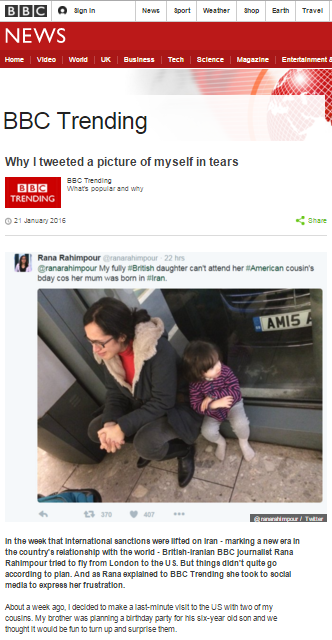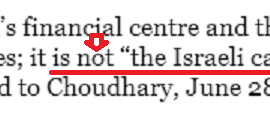On January 20th followers of the BBC News Twitter account were alerted to a story described as follows:

However, only those who followed the link and bothered to read the article – titled “BBC journalist Rana Rahimpour stopped from flying to US” – in full would appreciate that in fact the well promoted story (which is also told in an additional article by BBC Trending called “Why I tweeted a picture of myself in tears“) has nothing at all to do with the BBC or journalism and that it is actually about the visa related tribulations of a woman making a private journey who just happens to work for the corporation.
In an additional filmed interview on BBC News Rahimpour gave a positive answer to this loaded question from the presenter:
“Does this feel right now that you are being discriminated against because of your heritage?”
The question of whether or not journalists should become the story is of course largely a matter of taste but in this case it seems pretty clear that Ms Rahimpour’s BBC connections prompted wide coverage of an event which might otherwise have received much less exposure.
Interestingly, a previous story about another BBC employee did not receive any coverage from the corporation. BBC News producer Erica Chernofsky wrote about her experiences whilst driving in Judea & Samaria last October at the Times of Israel.
“And then suddenly there was a loud boom. And another, and another, and then another. And I couldn’t see a thing, and I heard my children screaming, the baby crying, I looked out my window and saw the Palestinian children, and then an Israeli soldier. I fumbled for my cell phone, following the protocol I had been taught but never had to use.
I called for help. I heard my voice shaking as I tried to explain where we were, what had happened, and as I did my car’s windscreen finally came into focus, it was smashed, my legs and arms were covered in glass, my knee was burning where a shard of glass was stuck inside my skin. And then I dropped the phone, suddenly remembering my children, ohmigod my children, the baby! I climbed out of my seat to look behind me as my husband continued driving away as fast as he could.
They were screaming, my 3-year-old was crying hysterically, my 6-year-old was yelling “what happened mommy, what happened!” over and over again. And the baby, was crying, screaming, oh, he’s such a good baby and he never cries, and then I saw he was covered in millions of tiny pieces of glass. The entire back windshield of the car had smashed in, there was glass everywhere, all over my children, all over my baby. In his hair, on his face, on his little onesie. I gently tried to shake the glass off him as my hands trembled, “drive faster, quickly, quickly, we have to check the baby,” I cried to my husband, who had somehow not lost control of the car during the attack. […]
It’s in the news all the time. Rock throwing. It seems trivial. But it wasn’t rocks. It wasn’t pebbles. It was giant blocks of stone, the rectangular kind that are used to build houses. And it can kill. Rocks, stones, guns, are all the same. They are weapons. They are violence. They are tools to commit murder.”
So, whilst a BBC employee with nationality-related visa problems makes the news, a BBC employee targeted in a terror attack for no other reason than her nationality did not.
Related Articles:
When stone-throwing at vehicles does interest the BBC





